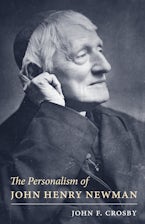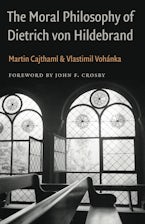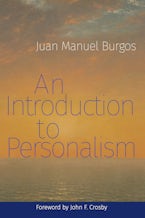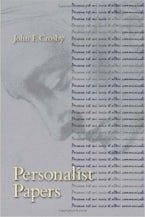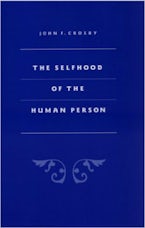Preparing your PDF for download...
There was a problem with your download, please contact the server administrator.
The Personalism of John Henry Newman
Imprint: Catholic University of America Press
It has been said that John Henry Newman "stands at the threshold of the new age as a Christian Socrates, the pioneer of a new philosophy of the individual Person and Personal Life." Newman's personalism is found in the way he contrasts the "theological intellect" and the "religious imagination." Newman pleads for the latter when he famously says, in words that John F. Crosby takes as the motto of his book, "I am far from denying the real force of the arguments in proof of a God...but these do not warm me or enlighten me; they do not take away the winter of my desolation, or make the buds unfold and the leaves grow within me, and my moral being rejoice."
In The Personalism of John Henry Newman, Crosby shows the reader how Newman finds the life-giving religious knowledge that he seeks. He explores the "heart" in Newman and explains what Newman was saying when he chose as his cardinal's motto, cor ad cor loquitur (heart speaks to heart). He explains what Newman means in saying that religious truth is transmitted not by argument but by "personal influence."
Crosby also examines Newman's personalist account of what it is to think; he explains what it is for a person to think not just by rule but by his "spontaneous living intelligence." Crosby examines the subjectivity of Newman, and shows how the modern "turn to the subject" is enacted in Newman. But these personalist aspects of Newman's mind, which connect him with many streams of contemporary thought, are not the whole of Newman; they stand in relation to something else in Newman, something that Crosby calls Newman's radically theocentric religion.
Newman is a modern thinker, but not the modernist he is sometimes mistaken for. The inexhaustible plenitude of Newman derives from the union of apparent opposites in him: the union of his teaching on the heart with his theocentric teaching, of the subjectivity of experience with the objectivity of revealed truth.
Crosby writes for a broad non-specialist public just as Newman did.
ABOUT THE AUTHOR
John F. Crosby is Professor of Philosophy at Franciscan University of Steubenville, Ohio, and is a Senior Fellow at the Dietrich von Hildebrand Legacy Project.
PRAISE FOR THE BOOK
"A powerful witness to the influence of Newman's character, teaching and preaching on those who experienced it. Crosby's major contribution is the way that he relates Newman's personalism to his theocentrism. No other writer has brought out this link so well. Relevant for Catholic educators as well as moral philosophy and moral theology. Specialists in Newman will find great interest in Crosby's book." --John Sullivan, Liverpool Hope University, UK
John F. Crosby is professor of philosophy at Franciscan University of Steubenville, Ohio
"Readers familiar with Newman will profit from this careful, clear, well-reasoned, persuasive, and engaging work… Summing up: recommended"
~D.A. Brown, CHOICE
"Long-standing students of Newman will welcome Crosby's fine study, while newcomers will find here a winning introduction to the thought of the great precursor of Vatican II. The book, written in an engaging, almost conversational style, develops a careful, cogent argument for Newman as a 'personalist' thinker...we see revealed the christological basis of Newman's personalism: heart truly speaking to heart."
~Theological Studies
"Crosby's book is an excellent addition to Newman scholarship as well as to personalist thinkers. Newman scholars will gain fro mthe exposure to (mostly European) personalists whose thought clarifies and extends Newman's vision, while personalists will gain from their exposure to a great English prose writer ahead on the path."
~David Deavel, Univ St Thomas, American Catholic Philosophical Quarterly
"John F. Crosby's The Personalism of John Henry Newman further contributes by taking one element of Newman's thought, the personalist element, and showing how it is present across Newman's works. In so doing, Crosby highlights an important feature of Newman's mind that might otherwise get lost in the big picture."
~David C. Paternostro, SJ, New Oxford Review
"this book is a masterwork, Crosby has accomplished what very few writers could do successfully; he has provided a stellar synthesis of Newman's personalist thought both in itself and in relation to many philosophers and theologians. Crosby is well-versed in the corpus of Newman's writings... Crosby's book is a tour de force that only the most philosophically proficient could manage... Crosby must be congratulated for a praiseworthy philosophical presentation of Newman's 'personalism'."
~Newman Studies Journal

